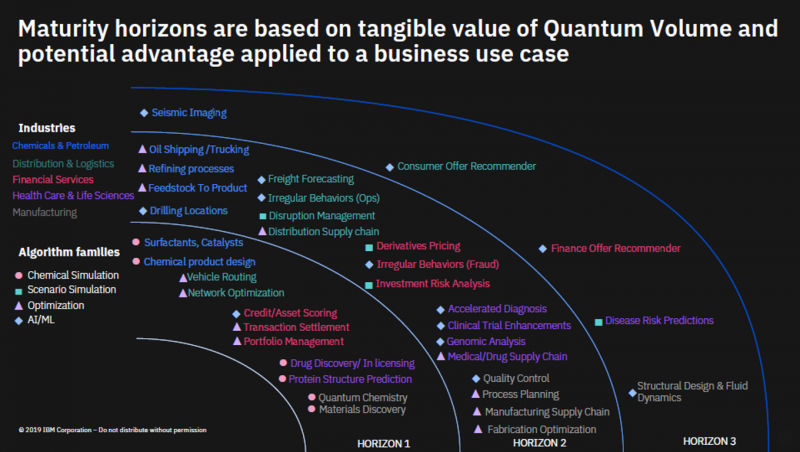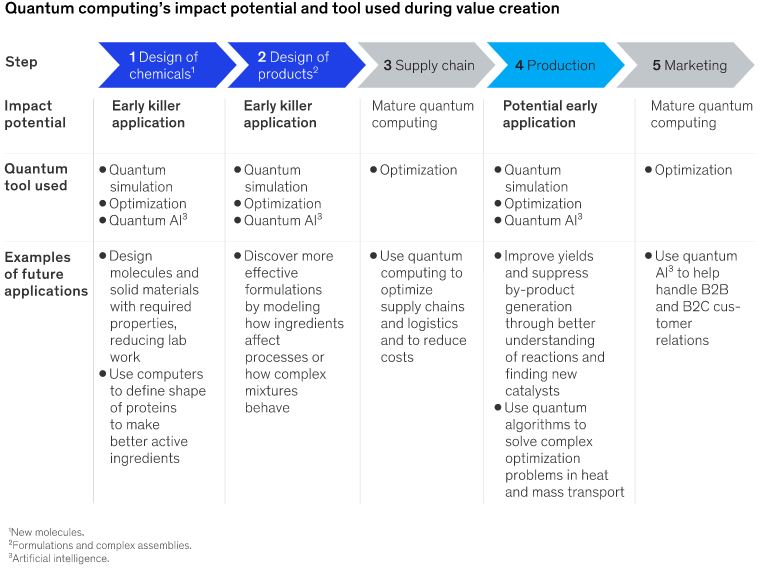Recent development in quantum computing (QC), such as Google achieving quantum supremacy, increased interest in QC. However, there is little information on how quantum computing can impact businesses. Our research points to these areas of quantum computing applications:
- Optimization
- Research
- Cryptography/espionage
- Industry specific applications: Quantum computing is expected to have the most significant impact in finance, materials science and healthcare
Companies like Google, IBM and Microsoft are taking the first steps into providing quantum computing platforms. Many other companies aim to lead pioneering research in their areas of specialization thanks to quantum computing. For example Bosch aims to develop new energy storage and functional materials by using quantum simulations.
What is the timeline for quantum applications?
IBM predicts quantum computing use cases to evolve over 3 horizons.:
- Horizon 1: Applications in the next few years
- Horizon 2: After stable but not optimally working quantum computers
- Horizon 3: Beyond 15 years

Optimization
Optimization problems exist in all industries and business functions and some of these problems take too long to be solved optimally with traditional computers. 2 quantum approaches can be used to solve these problems:
- Quantum annealing is an optimization heuristic that is expected to surpass classical computers in certain optimization problems. Quantum annealing can be implemented on specialized quantum annealers which are far easier to build than a universal quantum computer. Currently such computers are available however, their supremacy over classical computers is yet to be decisively proven. Cheaper digital annealers simulate quantum annealers using classical computing and pose cost-effective alternatives.
- Universal quantum computers: They are capable of solving all types of computational problems. However, they will take longer to be commercially available as more research is required to increase their reliability
Companies such as JP Morgan, Airbus, Daimler are among the companies testing quantum systems for their optimization challenges
Some optimization problems from various industries where we need to rely on sub-optimal heuristics are listed below. Quantum computers can solve these problems and identify global optimum:
- Automotive:
- 1- Optimizing large autonomous fleets
- Energy:
- 2- Utilization prediction
- 3- Grid optimization
- Finance:
- 4- Automated trading (e.g. predicting financial markets)
- 5- Risk analysis
- 6- Portfolio optimization
- 7- Fraud detection
- Insurance:
- 8- Valuation of instruments, premiums in complex cases
- Logistics:
- 9- Supply chain optimization
- 10- Inventory optimization
- Manufacturing
- 11- Design optimization (e.g. batteries, chips, vehicles etc.)
- Pharma:
- 12- Drug interaction prediction
- 13- Personalized medicine taking into account genomics
- Technology/software
- 14- Machine learning
Research
Quantum simulation can help scientist better understand molecule and sub-molecule level interactions which can lead to breakthroughs in chemistry, biology, healthcare and nanotechnology.
Physical experiments and the analysis of the results are basic methods that used in chemistry research. Simulating these researches in the classical computer environment and accelerating the process without the need for physical experiments seems far away. On the other hand, noise, which appears to be a problem for quantum computers, can be useful in chemical research. The noise generated by simulations with quantum computations reveals properties about chemical reactions.
- 15- Material science: Unlike other fields of application, it may not be necessary to wait for quantum computing to solve the noise problem for materials science applications since noise can help reveal properties about chemical reactions. Room temperature superconductors, long-life batteries and catalysts that do not require high temperature could be discovered.
- 16- Drug research: The molecular biology and healthcare also includes a process similar to chemical research, which can replace laboratory experiments with quantum computing simulations. Releasing a drug is a challenging process that takes many years and costs about $ 2.7 billion.
- 17- Accelerating drug approval process: By enabling investigations into the effects of diseases on the human body and simulations on molecular level, quantum computers can accelerate drug testing.
18- Cryptography
If you are communicating state-level secrets, you should probably be and you probably already are making sure that your encryption is quantum-ready.
Quantum computers have been proven to break the most common encryption algorithms such as the public key cryptographic system RSA. This problem can be solved by costly change of cryptography algorithms and as with all investments with uncertain rewards, it should be delayed as much as possible. However, delaying change of encryption techniques has an inherent risk, what if an actor builds quantum computer with sufficient power to break RSA and does not publish its findings? Since the investment necessary to break RSA with quantum encryption can only be afforded by mega corporations and governments, there is limited cause for concern for the average enterprise.
However, if you are communicating state-level secrets, you should probably be and you probably are making sure that your encryption is quantum-ready. No one wants to end up like Nazi Germany in WW2 which had its crypto system broken by the Allies and was not aware of this data leak.
There are already quantum-ready encryption algorithms that rely on problems other than integer factorization such as lattice based crypto systems or McEliece crypto system. Quantum cryptography is likely to provide quantum-ready encryption algorithms as well.
At Microsoft, a team is working on “Post-quantum Cryptography”. The aim is to determine how specific information and communications are made when powerful quantum computers are achieved.
19- Espionage
Search problems with no searchable structure and with as many answers as inputs are also solvable more efficiently with quantum computers. Password crackers are the most common application.
Even if post-quantum cryptography is achieved, it will take time to replace the methods designed for conventional computers. In this process, the danger of breaking security and defense systems will increase.
Cyber-attacks against banks, hospitals and other institutes that are not quantum proof can create a security problem for all nations. Start-up companies like ISARA have already started to develop methods against quantum hacking, but it is unclear if they will be sufficient.
Industry specific applications
There are numerous industry specific applications of quantum computing. You can see an example from McKinsey below which shows quantum computing’s impact potential for a chemical manufacturer.
- 20- Chemical material production: Please see below the potential impact of quantum computing in different stages of chemical material production. Most other use cases are explained in the other sections above, but production is a specific area where quantum optimization algorithms could improve yields:




